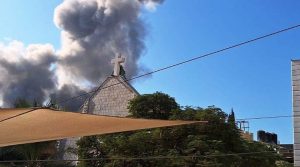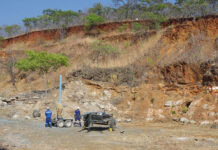
By Talkmore Gandiwa
The State of Palestine is outraged and deeply saddened by the latest attack on the Latin Church in Gaza City, which resulted in the loss of innocent lives, injuries, and extensive damage to the church building. This heinous act is part of a systematic policy of desecration and genocide committed by the occupation against all forms of human life in the Gaza Strip.
Once a sanctuary for the spiritual and the vulnerable, the Latin Church in Gaza City became the latest symbol of devastation following a direct strike during an Israeli military operation. Media reported that families sheltering inside the church compound were among the dead and wounded, with shattered stained glass and torn pews now replacing sacred silence and prayer. The church, a place of refuge for Gaza’s dwindling Christian community, stood as a beacon of coexistence in a land long plagued by division—until now.
This attack is not an isolated event, but rather a continuation of a pattern that has targeted religious sites with increasing frequency and brutality. In October 2023, the historic Church of Saint Porphyrius, a Greek Orthodox landmark that has stood since the 5th century, was bombed during an Israeli airstrike, killing at least 18 Palestinian civilians. At the time, over 500 Christians and Muslims were sheltering in the church complex, many of them displaced from homes destroyed in prior strikes.
The targeting of churches follows a broader trend of destruction in Gaza. According to data compiled by Palestinian authorities and verified by human rights groups, over 85% of the territory’s mosques have been either completely or partially destroyed since the escalation of hostilities in 2023. This includes significant cultural and religious centers that have stood for generations, now reduced to rubble.
Religious persecution in the conflict is not limited to Gaza. In Jerusalem, the third-holiest site in Islam, Al-Aqsa Mosque, has been the scene of repeated Israeli incursions and provocations. Armed forces and settlers have stormed the compound during prayer times, attacking worshippers and forcibly clearing the area under the pretext of “security measures.” These incursions have sparked outrage across the Muslim world and increased tensions in an already volatile region.
Christian communities in the West Bank are also under siege. The town of Taybeh, the last all-Christian town in the West Bank, located east of Ramallah, has witnessed a surge in settler violence. In recent months, St. George Church and the adjacent cemetery have been desecrated by extremist Israeli settlers. Reports indicate tombstones were smashed, religious icons defaced, and local residents harassed and threatened. These acts have gone largely unpunished, reinforcing a culture of impunity and fear.
The Christian population in historic Palestine has plummeted over the decades. In 1948, Christians made up around 8% of the total population. Today, they represent less than 1.5%. In Gaza, the Christian population has dwindled to under 1,000, compared to about 3,000 in the early 2000s. Most of those remaining are elderly and have repeatedly expressed fears over their safety and future in a territory under siege.
Ambassador of Palestine to Zimbabwe Tamer Almassri, a vocal advocate for interfaith solidarity and the rights of religious minorities, has issued a passionate appeal to global religious leaders. He has urged Patriarchs, Eminences, and Heads of Churches around the world to rise beyond silence and rhetoric.
“The destruction of churches in Palestine is not collateral damage—it is a message, a campaign to erase Christianity from its birthplace,” said Almassri. “We ask not only for prayers but for public, unequivocal condemnation. Words must be followed by action. The occupying power must be held accountable.”
Almassri warned that without bold and principled action, the Holy Land risks losing its unique religious and cultural mosaic—an identity shaped by centuries of shared coexistence among Muslims, Christians, and Jews.
The Palestinian leadership has also called on the international community to immediately intervene and halt what it describes as Israel’s deliberate policy of collective punishment. The humanitarian situation in Gaza is deteriorating rapidly. According to the United Nations Office for the Coordination of Humanitarian Affairs (OCHA), over 2.2 million people in Gaza now face food insecurity, with 70% of the population displaced from their homes. Health facilities are overwhelmed or destroyed, clean water is scarce, and electricity is available for less than two hours a day.
Fuel shortages have forced hospitals to shut down life-saving equipment. Maternity wards operate in darkness, neonatal units lack incubators, and patients requiring dialysis or chemotherapy are left untreated. The UN has warned that Gaza is on the brink of famine, with children and the elderly most at risk.
Despite the dire need, humanitarian aid convoys are frequently delayed, restricted, or outright denied entry by Israeli authorities. International organizations, including UNRWA, Médecins Sans Frontières, and the International Red Cross, have raised alarms about what they call the deliberate obstruction of aid, in direct violation of international humanitarian law.
The Palestinian Ministry of Foreign Affairs has described the situation as an “unprecedented humanitarian disaster exacerbated by war crimes and systemic apartheid.” It has urged the UN Security Council, the International Criminal Court, and global civil society to take urgent and decisive steps. These include enforcing accountability mechanisms, implementing arms embargoes, and protecting religious and cultural heritage sites in accordance with the Hague Convention of 1954.
Meanwhile, communities across the diaspora and global interfaith networks have begun organizing vigils, protests, and advocacy campaigns. In Rome, Athens, London, and Cape Town, church bells tolled in mourning for the victims of the Latin Church bombing. Faith-based organizations are calling for a global “Week of Solidarity with Palestinian Christians,” urging people of all religions to stand united against religious persecution and cultural erasure.
As the bombs continue to fall and the destruction deepens, the message from the State of Palestine remains clear: this is not merely a conflict over land or politics, but a battle for identity, memory, and humanity itself.
The State of Palestine reiterates its appeal to the international community—governments, religious leaders, and ordinary citizens—to act now. The silence of the world, it warns, risks becoming complicity in the erasure of a people whose only crime is their existence.
The attack on the Latin Church is not just an attack on Christianity in Gaza—it is an assault on the very soul of the Holy Land.












